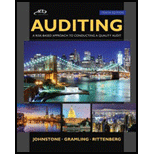
Auditing: A Risk Based-Approach to Conducting a Quality Audit
10th Edition
ISBN: 9781305080577
Author: Karla M Johnstone, Audrey A. Gramling, Larry E. Rittenberg
Publisher: South-Western College Pub
expand_more
expand_more
format_list_bulleted
Concept explainers
Question
Chapter 2, Problem 7TFQ
To determine
Introduction: Fraud refers to an intended attempt to misrepresent the financial statement of an entity in order to attain some personal gain or advantage.
To examine: Whether the given statement is true or false.
Expert Solution & Answer
Want to see the full answer?
Check out a sample textbook solution
Students have asked these similar questions
The industrial enterprise "HUANG S.A." purchased a sorting and packaging machine from a foreign company on 1/4/2017 at a cost of €500,000. The useful life of the machine was estimated by the Management at ten (10) years, while the residual value was estimated at zero.
For the transportation of the machine from abroad to the company's factory, the amount of €20,000 was paid on 15/4/2017. As the insurance coverage of the machine during transportation was the responsibility of the selling company, HUANG S.A. proceeded to insure the machine from 16/4/2017 to 15/4/2018, paying the amount of €1,200. The delivery took place on 15/4/2017.
As adequate ventilation of the multifunction device is essential for its proper operation, the company fitted an air duct on the multifunction device. The cost of the air duct amounted to €2,000 and was paid on 20/4/2017. On 25/4/2017, an external electrician was paid €5,000 for the electrical connection of the device.
The company also paid €5,000 to an…
The industrial enterprise "HUANG S.A." purchased a sorting and packaging machine from a foreign company on 1/4/2017 at a cost of €500,000. The useful life of the machine was estimated by the Management at ten (10) years, while the residual value was estimated at zero.
For the transportation of the machine from abroad to the company's factory, the amount of €20,000 was paid on 15/4/2017. As the insurance coverage of the machine during transportation was the responsibility of the selling company, HUANG S.A. proceeded to insure the machine from 16/4/2017 to 15/4/2018, paying the amount of €1,200. The delivery took place on 15/4/2017.
As adequate ventilation of the multifunction device is essential for its proper operation, the company fitted an air duct on the multifunction device. The cost of the air duct amounted to €2,000 and was paid on 20/4/2017. On 25/4/2017, an external electrician was paid €5,000 for the electrical connection of the device.
The company also paid €5,000 to an…
I need answer typing clear urjent no chatgpt used pls i will give 5 Upvotes.only typing .
Chapter 2 Solutions
Auditing: A Risk Based-Approach to Conducting a Quality Audit
Ch. 2 - The Great Salad Oil Swindle of 1963 is an asset...Ch. 2 - Prob. 2TFQCh. 2 - The three elements of the fraud triangle include...Ch. 2 - Prob. 4TFQCh. 2 - Prob. 5TFQCh. 2 - Prob. 6TFQCh. 2 - Prob. 7TFQCh. 2 - Prob. 8TFQCh. 2 - Prob. 9TFQCh. 2 - Prob. 10TFQ
Ch. 2 - Prob. 11TFQCh. 2 - Prob. 12TFQCh. 2 - Prob. 13MCQCh. 2 - Prob. 14MCQCh. 2 - Prob. 15MCQCh. 2 - Prob. 16MCQCh. 2 - Prob. 17MCQCh. 2 - Prob. 18MCQCh. 2 - Prob. 19MCQCh. 2 - Prob. 20MCQCh. 2 - Prob. 21MCQCh. 2 - Prob. 22MCQCh. 2 - Prob. 23MCQCh. 2 - Prob. 24MCQCh. 2 - Prob. 25RSCQCh. 2 - Prob. 26RSCQCh. 2 - Prob. 27RSCQCh. 2 - Refer to Exhibit 2.1 a. What is a Ponzi scheme? b....Ch. 2 - Prob. 29RSCQCh. 2 - Prob. 30RSCQCh. 2 - Prob. 31RSCQCh. 2 - Prob. 32RSCQCh. 2 - Prob. 33RSCQCh. 2 - Prob. 34RSCQCh. 2 - Prob. 35RSCQCh. 2 - Prob. 36RSCQCh. 2 - Prob. 37RSCQCh. 2 - Prob. 38RSCQCh. 2 - Many consider the Enron fraud to be one of the...Ch. 2 - Prob. 40RSCQCh. 2 - Prob. 41RSCQCh. 2 - Refer to Exhibit 2.5 and answer the following...Ch. 2 - Prob. 43RSCQCh. 2 - Prob. 44RSCQCh. 2 - Prob. 45RSCQCh. 2 - Prob. 46RSCQCh. 2 - Prob. 47RSCQCh. 2 - Prob. 48RSCQCh. 2 - Prob. 49RSCQCh. 2 - Prob. 50FFCh. 2 - Prob. 51FFCh. 2 - Prob. 52FF
Knowledge Booster
Learn more about
Need a deep-dive on the concept behind this application? Look no further. Learn more about this topic, accounting and related others by exploring similar questions and additional content below.Similar questions
arrow_back_ios
SEE MORE QUESTIONS
arrow_forward_ios
Recommended textbooks for you
 Auditing: A Risk Based-Approach (MindTap Course L...AccountingISBN:9781337619455Author:Karla M Johnstone, Audrey A. Gramling, Larry E. RittenbergPublisher:Cengage LearningBusiness/Professional Ethics Directors/Executives...AccountingISBN:9781337485913Author:BROOKSPublisher:Cengage
Auditing: A Risk Based-Approach (MindTap Course L...AccountingISBN:9781337619455Author:Karla M Johnstone, Audrey A. Gramling, Larry E. RittenbergPublisher:Cengage LearningBusiness/Professional Ethics Directors/Executives...AccountingISBN:9781337485913Author:BROOKSPublisher:Cengage- Principles of Accounting Volume 1AccountingISBN:9781947172685Author:OpenStaxPublisher:OpenStax College
 Auditing: A Risk Based-Approach to Conducting a Q...AccountingISBN:9781305080577Author:Karla M Johnstone, Audrey A. Gramling, Larry E. RittenbergPublisher:South-Western College Pub
Auditing: A Risk Based-Approach to Conducting a Q...AccountingISBN:9781305080577Author:Karla M Johnstone, Audrey A. Gramling, Larry E. RittenbergPublisher:South-Western College Pub

Auditing: A Risk Based-Approach (MindTap Course L...
Accounting
ISBN:9781337619455
Author:Karla M Johnstone, Audrey A. Gramling, Larry E. Rittenberg
Publisher:Cengage Learning


Business/Professional Ethics Directors/Executives...
Accounting
ISBN:9781337485913
Author:BROOKS
Publisher:Cengage

Principles of Accounting Volume 1
Accounting
ISBN:9781947172685
Author:OpenStax
Publisher:OpenStax College

Auditing: A Risk Based-Approach to Conducting a Q...
Accounting
ISBN:9781305080577
Author:Karla M Johnstone, Audrey A. Gramling, Larry E. Rittenberg
Publisher:South-Western College Pub